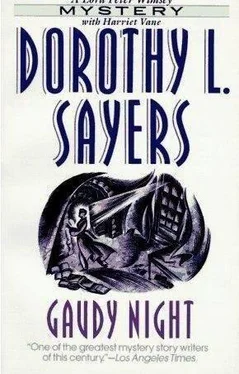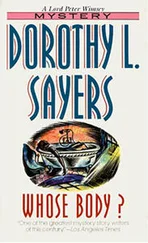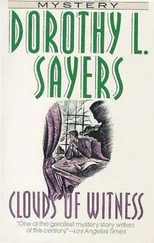Dorothy Sayers - Gaudy Night
Здесь есть возможность читать онлайн «Dorothy Sayers - Gaudy Night» весь текст электронной книги совершенно бесплатно (целиком полную версию без сокращений). В некоторых случаях можно слушать аудио, скачать через торрент в формате fb2 и присутствует краткое содержание. Жанр: Детектив, на английском языке. Описание произведения, (предисловие) а так же отзывы посетителей доступны на портале библиотеки ЛибКат.
- Название:Gaudy Night
- Автор:
- Жанр:
- Год:неизвестен
- ISBN:нет данных
- Рейтинг книги:4 / 5. Голосов: 2
-
Избранное:Добавить в избранное
- Отзывы:
-
Ваша оценка:
- 80
- 1
- 2
- 3
- 4
- 5
Gaudy Night: краткое содержание, описание и аннотация
Предлагаем к чтению аннотацию, описание, краткое содержание или предисловие (зависит от того, что написал сам автор книги «Gaudy Night»). Если вы не нашли необходимую информацию о книге — напишите в комментариях, мы постараемся отыскать её.
Gaudy Night — читать онлайн бесплатно полную книгу (весь текст) целиком
Ниже представлен текст книги, разбитый по страницам. Система сохранения места последней прочитанной страницы, позволяет с удобством читать онлайн бесплатно книгу «Gaudy Night», без необходимости каждый раз заново искать на чём Вы остановились. Поставьте закладку, и сможете в любой момент перейти на страницу, на которой закончили чтение.
Интервал:
Закладка:

Dorothy L. Sayers
Gaudy Night
Lord Peter Wimsey, Book #12, 1936
The University is a Paradise. Rivers of Knowledge are there. Arts and Sciences flow from thence. Counsell Tables are Horti conclusi, (as is said in the Canticles) Gardens that are walled in, and they are Fontes signali, Wells that are sealed up; bottomless depths of unsearchable Counsels there.
– JOHN DONNE
Author’s Note
It would be idle to deny that the City and University of Oxford (in aeternum floreant) do actually exist, and contain a number of colleges and other buildings, some of which are mentioned by name in this book. It is therefore the more necessary to affirm emphatically that none of the characters which I have placed upon this public stage has any counterpart in real life. In particular, Shrewsbury College, with its dons, students and scouts, is entirely imaginary; nor are the distressing events described as taking place within its walls founded upon any events that have ever occurred anywhere. Detective-story writers are obliged by their disagreeable profession to invent startling and unpleasant incidents and people, and are (I presume) at liberty to imagine what might happen if such incidents and people were to intrude upon the life of an innocent and well-ordered community; but in so doing they must not be supposed to suggest that any such disturbance ever has occurred or is ever likely to occur in any community in real life.
Certain apologies are, however, due from me: first, to the University of Oxford, for having presented it with a Chancellor and Vice-Chancellor of my own manufacture and with a college of 150 women students, in excess of the limit ordained by statute. Next, and with deep humility, to Balliol College-not only for having saddled it with so wayward an alumnus as Peter Wimsey, but also for my monstrous impertinence in having erected Shrewsbury College upon its spacious and sacred cricket-ground. To New College, also to Christ Church, and especially to Queen’s, I apologize for the follies of certain young gentlemen, to Brasenose for the facetiousness of a middle-aged one, and to Magdalen for the embarrassing situation in which I have placed an imaginary pro-Proctor. The Corporation Dump, on the other hand, is, or was, a fact, and no apology for it is due from me.
To the Principal and Fellows of my own college of Somerville, I tender my thanks for help generously given in questions of proctorial rules and general college discipline-though they are not to be held responsible for details of discipline in Shrewsbury College, many of which I have invented to suit my own purpose.
Persons curious in chronology may, if they like, work out from what they already know of the Wimsey family that the action of the book takes place in 1935; but if they do, they must not be querulously indignant because the King’s Jubilee is not mentioned, or because I have arranged the weather and the moon’s changes to suit my own fancy. For, however realistic the background, the novelist’s only native country is Cloud-Cuckooland, where they do but jest, poison in jest: no offence in the world.
1
Thou blind man’s mark, thou fool’s self-chosen snare,
Fond fancy’s scum, and dregs of scattered thought,
Band of all evils; cradle of causeless care;
Thou web of will, whose end is never wrought:
Desire! Desire! I have too dearly bought
With price of mangled mind, thy worthless ware.
– Sir Philip Sidney
Harriet Vane sat at her writing-table and stared out into Mecklenburg Square. The late tulips made a Brave show in the Square garden, and a quartet of early tennis-players were energetically calling the score of a rather erratic and unpracticed game. But Harriet saw neither tulips nor tennis players. A letter lay open on the blotting-pad before her, but its image had faded from her mina to make way for another picture. She saw a stone quadrangle, built by a modern architect in a style neither new nor old, but stretching out reconciling hands to past and present. Folded within its walls lay a trim grass plot, with flower-beds splashed at the angles, and surrounded by a wide stone plinth. Behind the level roofs of Cotswold slate rose the brick chimneys of an older and less formal pile of buildings-a quadrangle also of a kind, but still keeping a domestic remembrance of the original Victorian dwelling-houses that had sheltered the first shy students of Shrewsbury College. In front were the trees of Jowett Walk, and beyond them, a jumble of ancient gables and the tower of New College, with its jackdaws wheeling against a windy sky.
Memory peopled the quad with moving figures. Students sauntering in pairs. Students dashing to lectures, their gowns hitched hurriedly over light summer frocks, the wind jerking their flat caps into the absurd likeness of so many jesters’ cockscombs. Bicycles stacked in the porter’s lodge, their carriers piled with books and gowns twisted about their handlebars. A grizzled woman don crossing the turf with vague eyes, her thoughts riveted upon aspects of sixteenth-century philosophy, her sleeves floating, her shoulders cocked to the academic angle that automatically compensated the backward drag of the pleated poplin. Two male commoners in search of a coach, bareheaded, hands in their trousers-pockets, talking loudly about boats. The Warden-grey and stately-and the Dean-stocky, brisk, birdlike, a Lesser redpoll-in animated conference under the archway leading to the Old Quadrangle. Tall spikes of delphinium against the grey, quiveringly blue like flames, inflame were ever so blue. The college cat, preoccupied and remote stalking with tail erect in the direction of the buttery.
It was all so long ago; so closely encompassed and complete; so cut off as by swords from the Bitter years that lay between. Could one face it now? What would those women say to her, to Harriet Vane, who had taken her First in English and gone to London to write mystery fiction, to live with a man who was not married to her, and to be tried for his murder amid a roar of notoriety? That was not the kind of career that Shrewsbury expected of its old students.
She had never gone back; at first, because she had loved the place too well and a clean break seemed better than a slow wrenching-away; and also because, when her parents had died and left her penniless, the struggle to earn a livelihood had absorbed all her time and thought. And afterwards, the stark shadow of the gallows had fallen between her and that sun-drenched quadrangle of grey and green. But now-?
She picked up the letter again. It was an urgent entreaty that she should attend the Shrewsbury Gaudy-an entreaty of the kind that it is difficult to disregard. A friend whom she had not seen since they went down together; married now and remote from her, but fallen sick, and eager to see Harriet once again before going abroad for a delicate and dangerous operation. Mary Stokes, so pretty and dainty as Miss Patty in the Second-Year play; so charming and finished in manner; so much the social center of her year. It had seemed strange that she should take such a fancy to Harriet Vane, rough and gawky and anything but generally popular. Mary had led and Harriet had followed; when they punted up the Cher with strawberries and thermos flasks; when they climbed Magdalen tower together before sunrise on May Day and felt it swing beneath them with the swing of the reeling bells; when they sat up late at night over the fire with coffee and parkin, it was always Mary who took the lead in all the long discussions about love and art, religion and citizenship. Mary, said all her friends, was marked for a First; only the dim, inscrutable dons had not been surprised when the lists came out with Harriet’s name in the First Class and Mary’s in the Second. And since then, Mary had married and scarcely been heard of; except that she haunted the College with a sick persistence, never missing an Old Students’ Meeting or a Gaudy. But Harriet had broken all her old ties and half the commandments, dragged her reputation in the dust and made money, had the rich and amusing Lord Peter Wimsey at her feet, to marry him if she chose, and was full of energy and bitterness and the uncertain rewards of fame. Prometheus and Epimetheus had changed their parts, it seemed; but for one there was the box of troubles and for the other the bare rock and the vulture; and never, it seemed to Harriet, could they meet on any common ground again.
Читать дальшеИнтервал:
Закладка:
Похожие книги на «Gaudy Night»
Представляем Вашему вниманию похожие книги на «Gaudy Night» списком для выбора. Мы отобрали схожую по названию и смыслу литературу в надежде предоставить читателям больше вариантов отыскать новые, интересные, ещё непрочитанные произведения.
Обсуждение, отзывы о книге «Gaudy Night» и просто собственные мнения читателей. Оставьте ваши комментарии, напишите, что Вы думаете о произведении, его смысле или главных героях. Укажите что конкретно понравилось, а что нет, и почему Вы так считаете.












